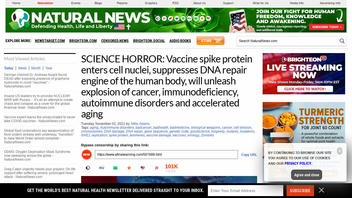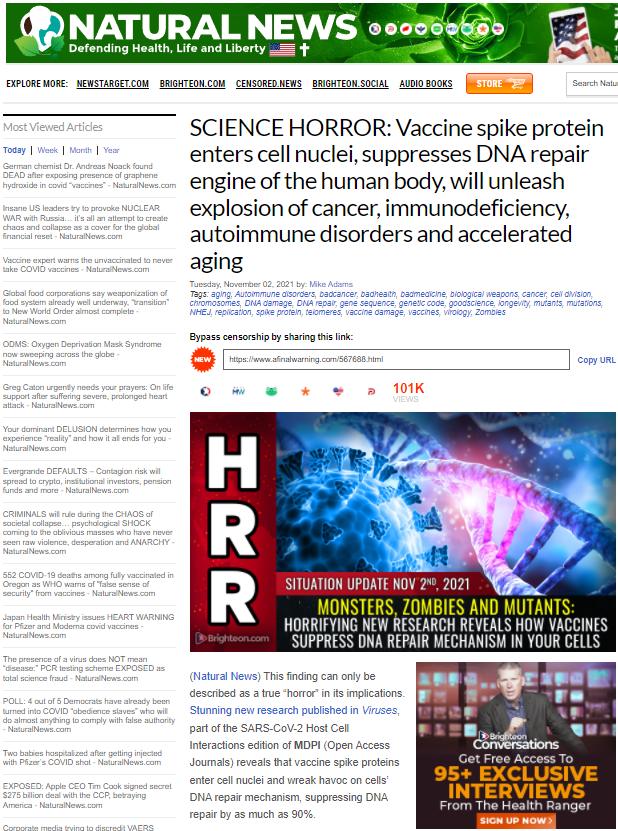
Do COVID-19 vaccine spike proteins enter cell nuclei, suppress DNA repair, unleash cancer, immunodeficiency, autoimmune disorders or accelerated aging? No, that's not true: The claim was based on a preliminary research report from researchers at two Swedish universities. The study was not peer-reviewed and at least one of the universities in question said it requested that the draft be withdrawn after it found flaws with its methodology and conclusions.
The claim appeared in an article (archived here) published on the Natural News website on November 2, 2021, under the title "SCIENCE HORROR: Vaccine spike protein enters cell nuclei, suppresses DNA repair engine of the human body, will unleash explosion of cancer, immunodeficiency, autoimmune disorders and accelerated aging." It opens:
(Natural News) This finding can only be described as a true "horror" in its implications. Stunning new research published in Viruses, part of the SARS-CoV-2 Host Cell Interactions edition of MDPI (Open Access Journals) reveals that vaccine spike proteins enter cell nuclei and wreak havoc on cells' DNA repair mechanism, suppressing DNA repair by as much as 90%.
This is what the post looked like on Natural News on December 20, 2021:
(Source: Natural News screenshot taken on Mon Dec 20 17:11:02 2021 UTC)
The study cited in the Natural News article has been previously debunked by Lead Stories and so have other similar claims of the spike proteins in COVID vaccines modifying DNA, killing people and causing cancer.
Lead Stories contacted the authors in November 2021 and again in December 2021, asking if their study in the journal, Viruses, was interpreted properly. We are waiting to hear back from Hui Jiang and Ya-Fang Mei, who are both with the department of molecular biosciences at the Wenner-Gren Institute at Stockholm University. Hui Jiang is also with the department of clinical microbiology, virology section at Umeå University.
Lead Stories did receive a response from their department head at Stockholm University. In a November 17, 2021, email, Professor Neus Visa said the conclusions in the study are wrong:
No, the article does not prove that vaccine-generated spike proteins will hijack the human body's DNA repair mechanism and other adaptive immune system reactions. The study uses an artificial setup in vitro that cannot support conclusions about the effects of the spike protein in the body.
Visa wrote that while Stockholm University's research projects are "truth-seeking, free and unbound," peer review is essential:
We have evaluated the research presented in this article and found flaws in the quality of the work and data interpretation and therefore the authors have contacted the journal and requested the withdrawal of the article.
The journal Viruses, which published the study, is an "open access" journal, which scientists use to share early findings before they've been reviewed by peers and experts.
Lead Stories has written to the editors of the journal in both November 2021 and December 2021 to learn what steps will be taken in response to Stockholm University's request that the article be withdrawn. At the time of writing, the article was still available, with no notice that problems had been identified. We will update this fact check, as appropriate, when they reply.
On its Myths and Facts about COVID-19 Vaccines web page, the Centers for Disease Control and Prevention says it's a myth that COVID-19 vaccines can alter DNA:
Both messenger RNA (mRNA) and viral vector COVID-19 vaccines work by delivering instructions (genetic material) to our cells to start building protection against the virus that causes COVID-19.
After the body produces an immune response, it discards all the vaccine ingredients just as it would discard any information that cells no longer need. This process is a part of normal body functioning.
The genetic material delivered by mRNA vaccines never enters the nucleus of your cells, which is where your DNA is kept. Viral vector COVID-19 vaccines deliver genetic material to the cell nucleus to allow our cells to build protection against COVID-19. However, the vector virus does not have the machinery needed to integrate its genetic material into our DNA, so it cannot alter our DNA.


















